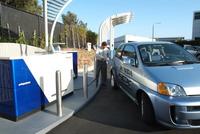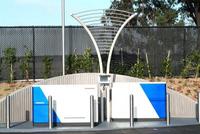Plug Power and Honda Achieve Major Milestone: Successful Demonstration of Home Energy Station
 The experimental Honda Home Energy Station converts natural gas into hydrogen for a vehicle and electricity and hot water for a home. |
LATHAM, N.Y., Oct. 2, 2003; Plug Power Inc. and Honda R&D Co., Ltd. of Japan announced today the successful demonstration of a prototype Home Energy Station at Honda R&D Americas' facility in Torrance, California. The Home Energy Station is a fully integrated system co-developed by Plug Power and Honda, using proprietary technologies from both companies. The system was developed under the exclusive joint development agreement that was signed between Plug Power and Honda in October 2002.
The system, fueled by natural gas, demonstrated its ability to export electricity to the grid, and generated, stored and delivered hydrogen fuel to Honda's FCX fuel cell vehicle. The Home Energy Station can produce enough hydrogen to fill one fuel cell vehicle every day. The system requires no electricity from the grid; all energy needs are derived from the natural gas fuel.
The prototype demonstration marks the completion of the first major milestone of Plug Power's work with Honda on the Home Energy Station. Plug Power and Honda intend to extend their collaboration into 2004 to improve the system design and conduct further testing and demonstration.
"The success of this demonstration showcases how effectively the Plug Power and Honda teams have worked together," commented Dr. Roger B. Saillant, Plug Power Chief Executive Officer. "The project serves as a springboard for ongoing collaboration with Honda, including continued development of the Home Energy Station."
Hydrogen fuel allows fuel cell vehicles to run with maximum efficiency and zero emissions, producing only water as a by-product. Widespread adoption of fuel cell vehicles will be facilitated by installation of a hydrogen-fueling infrastructure. The Home Energy Station is expected to offer customers a new paradigm in fueling convenience by allowing vehicle refueling, and providing electricity, heat, and backup power for the home or business.
In addition to the Home Energy Station product with Honda, backup power is an important feature of other products in Plug Power's portfolio. During the power blackout in the northeastern United States in August 2003, a number of Plug Power's current GenSys(TM) 5CS products continued to supply power to Plug Power's customers during the outage. Later this year, Plug Power expects to begin shipping the GenCore(TM) 5T, a backup power product for telecommunications applications. Plug Power's early experience with backup power technology should benefit the development effort with Honda, because the Home Energy Station is expected to leverage the same technology platform as these other products.
"The electricity blackouts in the U.S., U.K., Sweden, Denmark and, most recently, Italy, underscore the need for reliable backup power to protect our critical infrastructures, like telecom and broadband, and also to protect our homes and businesses," said Mark Sperry, Plug Power Chief Marketing Officer. "Our evolving product portfolio will emphasize value to the customer in terms of energy security and reliability."
About the Home Energy Station:
A Home Energy Station is a fuel cell system that provides heat, hot water, and electricity to a home or business, while also providing hydrogen fuel for a fuel cell vehicle. The product is fueled by natural gas and is expected to be more environmentally friendly than traditional energy devices due to its higher efficiency and lower emissions.
About Plug Power:
Plug Power Inc. designs, manufactures and markets on-site energy products for customers worldwide. Plug Power's strategic partners include GE Fuel Cell Systems, DTE Energy Technologies, Vaillant GmbH, Honda R&D Co., Ltd., Engelhard Corporation and Celanese Ventures. The Company's headquarters are located in Latham, N.Y., with offices in Washington, D.C., and The Netherlands.
About Honda:
Honda began operations in North America in 1959 with the establishment of American Honda Motor Co., Inc., Honda's first overseas subsidiary. Using domestic and globally sourced parts, Honda began assembling motorcycles in America in 1979, with U.S. automobile manufacturing starting in 1982. Honda designs, manufactures and markets its products in North America and worldwide. Honda currently builds products in 12 manufacturing plants in North America, with three major R&D centers in the U.S.



